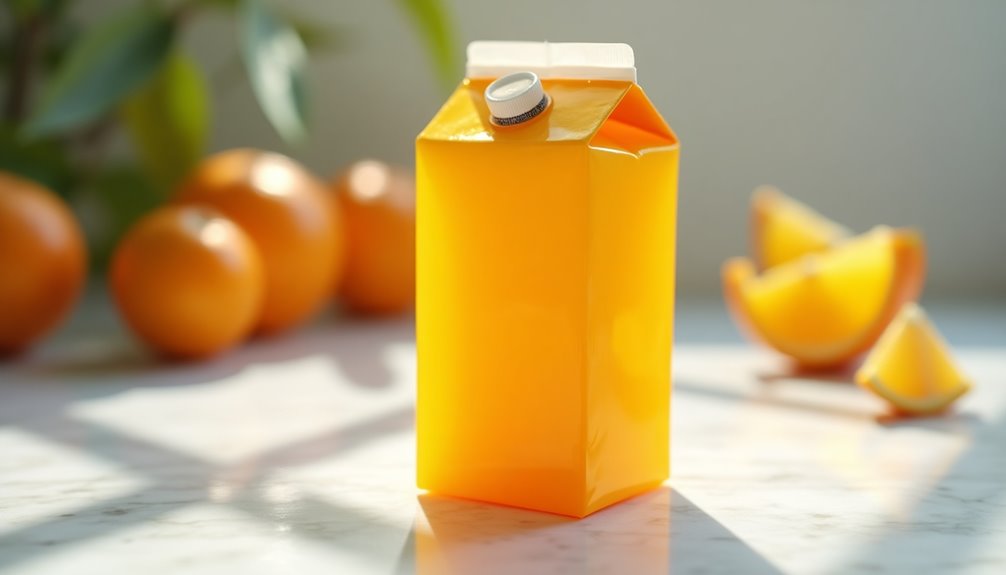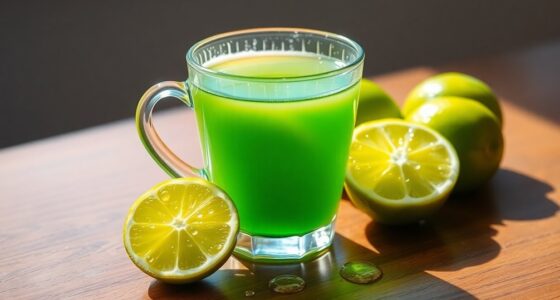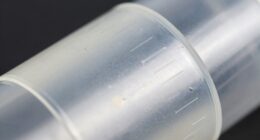Unopened orange juice is good for 12 to 18 months if you store it properly at room temperature. Just keep it in a cool, dark place away from sunlight and heat. If you refrigerate it, you can enjoy its quality for an additional 1 to 2 weeks past the printed date. Always inspect the container for bulging or leaks, and trust your instincts if anything seems off. There's more to know about juice quality and safety!
Key Takeaways
- Unopened orange juice lasts 12 to 18 months when stored properly at room temperature.
- Refrigeration can extend juice quality for 1 to 2 weeks beyond the printed best by date.
- Commercially canned or bottled juice remains safe if the container is undamaged, even past the printed date.
- Store unopened juice in a cool, dark place away from sunlight and heat for optimal quality.
- Always check for signs of spoilage before consumption, like bulging containers or off odors.

Have you ever wondered how long unopened orange juice can last? It's a question many people ask, especially when they find a carton or bottle hiding in the back of the pantry or fridge. Understanding the shelf life of unopened orange juice can help you avoid waste and ensure you're enjoying the best quality juice possible.
Generally, unopened orange juice can last anywhere from 12 to 18 months if stored properly at room temperature. This means that if you keep it in a cool, dark place away from direct sunlight and heat, you should be just fine. Once opened, however, orange juice should be refrigerated and consumed within a week for optimal freshness. It’s important to note that other juices, such as ginger juice, also have specific storage recommendations; for instance, the ginger juice shelf life in fridge is typically around 2 to 3 weeks. Always check for any signs of spoilage, such as an off odor or unusual texture, before consuming any juice.
If you decide to refrigerate your unopened orange juice, it'll maintain its quality for about 1 to 2 weeks past the printed best by date. This is crucial to remember if you've bought a carton expecting to drink it later. Just because it's past the printed date doesn't mean it's no longer safe to drink.
Commercially canned or bottled orange juice often remains safe to consume beyond that date, as long as the container is undamaged. So, if you've got a carton that's a little past its time, don't toss it immediately—check the condition first.
The key to extending the shelf life of your unopened orange juice is proper storage. Keeping it in a cool, dark place can significantly help maintain its quality over time. However, you should also be aware of the signs of spoilage.
If you notice any bulging or leaking containers, it's a clear indication that the juice is no longer safe to drink, even if it's still unopened. Spoilage can occur, and it's essential to trust your instincts—when in doubt, throw it out.
When you finally decide to open that carton or bottle, make sure to give it a good look and smell. If you notice any off odors, discoloration, or an unusual texture, it's best to discard it.
These signs of spoilage can indicate that the juice has gone bad, even if it was unopened until that moment. Enjoying fresh orange juice is all about quality, and you want to ensure that you're sipping on something that tastes great and is safe to drink.
Frequently Asked Questions
Does Orange Juice Expire if Unopened?
Unopened orange juice doesn't expire in the traditional sense, but it does have a shelf life.
You'll find it remains safe to drink for quite a while if stored properly. However, it's crucial to check for any signs of spoilage, like leaks or bulging containers.
If it looks fine, you can enjoy it beyond the best quality date, but always trust your senses before consuming it.
How Long Is Sealed Juice Good for After the Expiration Date?
Sealed juice can often remain safe to drink for a while after its expiration date.
If you store it properly in a cool, dark place, it might last 12-18 months for shelf-stable varieties.
For refrigerated juice, expect about 1-2 weeks of good quality past the date.
Always check for signs of spoilage like bloating or off smells before consuming, as these can indicate it's no longer safe.
How Long Does Tropicana Orange Juice Last Unopened?
Imagine your unopened Tropicana orange juice as a treasure chest, filled with vibrant flavors waiting to be discovered.
When stored properly, it can last 12 to 18 months at room temperature. If you keep it refrigerated, it'll maintain its peak quality for 1 to 2 weeks beyond the printed date.
Just remember to check for any signs of spoilage, like bulging packaging or off odors, before you pop that treasure open!
How to Tell if Juice Has Gone Bad?
To tell if juice has gone bad, start by pouring it into a clear glass and checking for any unusual masses or mold.
Next, observe the color; any significant discoloration indicates spoilage.
Smell the juice—if it smells rancid or like vinegar, it's not safe to drink.
Finally, taste a small amount; if it has an off flavor, discard it.
Regularly inspect the packaging for bloating or sediment too.
Conclusion
In conclusion, unopened orange juice can last quite a while if stored properly. Generally, it's good until the expiration date on the carton, often several months past the production date. For example, if you buy a carton on sale and forget about it in the back of your fridge, check the date—if it's still within range, you can still enjoy that refreshing glass! Just remember, when in doubt, trust your senses before taking a sip!
Cindy thoroughly researches juicing trends, techniques, and recipes to provide readers with practical advice and inspiration. Her writing style is accessible, engaging, and designed to make complex concepts easy to understand. Cindy’s dedication to promoting the advantages of juicing shines through her work, empowering readers to make positive changes in their lives through the simple act of juicing.











